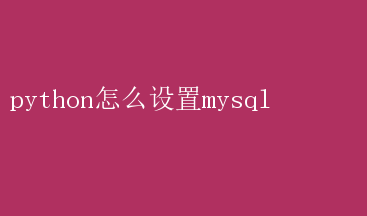Python配置MySQL数据库指南
资源类型:xikk.net 2025-06-23 20:43
python怎么设置mysql简介:

Python如何高效设置MySQL数据库连接与应用 在数据驱动的开发时代,数据库的使用至关重要
MySQL作为广泛使用的关系型数据库管理系统(RDBMS),因其高效、可靠和灵活的特点,成为众多开发者的首选
Python作为一种强大的编程语言,通过其丰富的库和框架,能够轻松与MySQL进行交互
本文将详细介绍如何在Python中设置MySQL数据库连接,并通过示例展示如何高效地进行数据操作
一、安装MySQL和必要的Python库 1. 安装MySQL 首先,需要在你的操作系统上安装MySQL
MySQL的安装步骤因操作系统而异: -Windows:访问MySQL官方网站下载MySQL Installer,并按照提示进行安装
-macOS:可以通过Homebrew安装MySQL,命令如下: bash brew install mysql -Linux:多数Linux发行版可以通过包管理器安装MySQL,例如在Ubuntu上: bash sudo apt-get update sudo apt-get install mysql-server 安装完成后,启动MySQL服务,并设置root用户密码
2. 安装MySQL Connector/Python MySQL官方提供了一个名为`mysql-connector-python`的Python库,用于与MySQL数据库进行交互
可以通过pip安装该库: bash pip install mysql-connector-python 除此之外,`PyMySQL`和`SQLAlchemy`也是常用的MySQL连接库,根据需求选择合适的库
二、建立数据库连接 在Python中,使用`mysql-connector-python`库可以轻松地建立与MySQL数据库的连接
以下是一个基本的连接示例: python import mysql.connector from mysql.connector import Error def create_connection(host_name, user_name, user_password, db_name): connection = None try: connection = mysql.connector.connect( host=host_name, user=user_name, passwd=user_password, database=db_name ) print(Connection to MySQL DB successful) except Error as e: print(fThe error{e} occurred) return connection 使用示例 connection = create_connection(localhost, root, yourpassword, testdb) 在上面的代码中,`create_connection`函数接受数据库的主机名、用户名、密码和数据库名作为参数,并尝试建立连接
如果连接成功,将返回一个连接对象;如果失败,则打印错误信息
三、创建和操作数据库表 在连接成功后,可以通过SQL语句来创建和操作数据库表
以下是一个示例,展示如何创建一个简单的用户表,并插入一些数据: python import mysql.connector from mysql.connector import Error def create_table(connection, create_table_sql): cursor = connection.cursor() try: cursor.execute(create_table_sql) print(Table created successfully...) except Error as e: print(fThe error{e} occurred) def insert_data(connection, insert_sql, data_tuple): cursor = connection.cursor() try: cursor.execute(insert_sql, data_tuple) connection.commit() print(Data inserted successfully...) except Error as e: print(fThe error{e} occurred) SQL语句 create_users_table = CREATE TABLE IF NOT EXISTS users( id INT AUTO_INCREMENT, name VARCHAR(100) NOT NULL, age INT, gender VARCHAR(10), PRIMARY KEY(id) ) insert_user = INSERT INTO users(name, age, gender) VALUES(%s, %d, %s) 使用示例 connection = create_connection(localhost, root, yourpassword, testdb) if connection is not None: create_table(connection, create_users_table) user_data =(Alice,30, Female) insert_data(connection, insert_user, user_data) connection.close() 在上面的代码中,`create_table`函数用于执行创建表的SQL语句,而`insert_data`函数则用于插入数据
通过`cursor.execute`方法执行SQL语句,并使用`connection.commit`方法提交事务
四、查询数据 查询数据是数据库操作中最常见的任务之一
以下是一个示例,展示如何从用户表中查询所有数据: python import mysql.connector from mysql.connector import Error def fetch_data(connection, select_sql): cursor = connection.cursor() result = None try: cursor.execute(select_sql) result = cursor.fetchall() return result except Error as e: print(fThe error{e} occurred) SQL语句 select_all_users = SELECTFROM users 使用示例 connection = create_connection(localhost, root, yourpassword, testdb) if connection is not None: users = fetch_data(connection, select_all_users) for user in users: print(user) connection.close() 在上面的代码中,`fetch_data`函数执行SQL查询语句,并使用`cursor.fetchall`方法获取所有结果
结果以元组列表的形式返回,每个元组代表一行数据
五、更新和删除数据 更新和删除数据同样重要
以下是更新和删除数据的示